
Djibouti is a country in the Horn of Africa. It is bordered by Eritrea in the north, Ethiopia in the west and south, and Somalia in the southeast. To the east is its coastline on the Red Sea and the Gulf of Aden. Rainfall is sparse, and most of the territory has a semi-arid to arid environment. Lake Assal is a saline lake which lies 155 m (509 ft) below sea level, making it the lowest point on land in Africa and the third-lowest point on Earth after the Sea of Galilee and the Dead Sea. Djibouti has the fifth smallest population in Africa. Djibouti's major settlements include the capital Djibouti City, the port towns of Tadjoura and Obock, and the southern cities of Ali Sabieh and Dikhil. It is the forty-six country by area in Africa and 147st largest country in the world by land area, covering a total of 23,200 km2 (9,000 sq mi), of which 23,180 km2 (8,950 sq mi) is land and 20 km2 (7.7 sq mi) is water.

Ismaïl Omar Guellé is a Djiboutian politician who has served as the President of Djibouti since 1999, making him one of the longest-serving rulers in Africa. He is often referred to by his initials, IOG.

French Somaliland was a French colony in the Horn of Africa. It existed between 1884 and 1967, at which became the French Territory of the Afars and the Issas. The Republic of Djibouti is its legal successor state.

The Tadjourah Region Somali: Gobolka Tajoora, Afar: Rakaakay Tagórri) is a region in north-central Djibouti, the largest of its six regions. With its capital at Tadjourah, it has an area of 7,100 square kilometres. It lies along the Gulf of Tadjoura, and the coastal city of Tadjoura. The region has active salt and fisheries industries, and is served by the Tadjoura Airport. In total area, it is larger than Brunei and smaller than Cyprus.
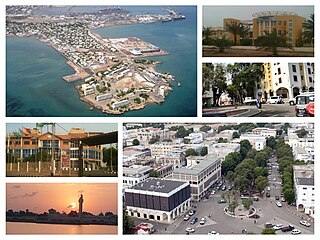
Djibouti is the capital city of the Republic of Djibouti. It is located in the coastal Djibouti Region on the Gulf of Tadjoura.
ISO 3166-2:DJ is the entry for Djibouti in ISO 3166-2, part of the ISO 3166 standard published by the International Organization for Standardization (ISO), which defines codes for the names of the principal subdivisions of all countries coded in ISO 3166-1.

Islam in Djibouti has a long history, first appearing in the Horn of Africa during the lifetime of Muhammad. Today, 98% of Djibouti's 490,000 inhabitants are Muslims. According to Pew, 77% follow the denomination of Sunnism, whilst 8% are non-denominational Muslim, and the remaining 13% follow other sects such as Quranism, Shia, Ibadism etc.. After independence, the nascent republic constructed a legal system based in part on Islamic law.
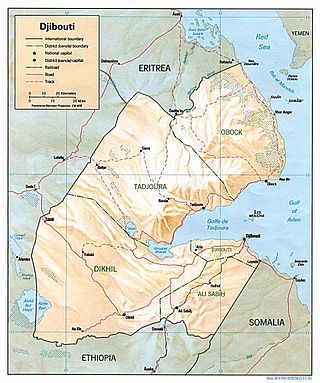
The wildlife of Djibouti, consisting of its flora and fauna, is in a harsh landscape with forest accounting for less than one percent of its area. Most species are found in the northern part of the country in the Day Forest National Park at an average elevation of 1,500 metres (4,900 ft), including the massif Goda, with a peak of 1,783 metres (5,850 ft). It covers an area of 3.5 square kilometres (1.4 sq mi) of Juniperus procera forest, with many of the trees rising to 20 metres (66 ft) height. This forest area is the main habitat of the critically endangered and endemic Djibouti spurfowl, and another recently noted vertebrate, Platyceps afarensis. The area also contains many species of woody and herbaceous plants, including boxwood and olive trees, which account for sixty percent of the identified species in the country.

The following outline is provided as an overview of and topical guide to Djibouti:

Djibouti, officially the Republic of Djibouti, is a country in the Horn of Africa, bordered by Somalia to the south, Ethiopia to the southwest, Eritrea in the north, and the Red Sea and the Gulf of Aden to the east. The country has an area of 23,200 km2 (8,958 sq mi).

Tourism in Djibouti is one of the growing economic sectors of the country and is an industry that generates 53,000 and 73,000 arrivals per year, with its favorable beaches and climate and also including islands and beaches in the Gulf of Tadjoura and the Bab al-Mandab. The main tourist activities are scuba diving, fishing, trekking and hiking, discovering the nomadic way, bird watching, and sun, sea and sand.
Telecommunications in Djibouti falls under the authority of the Ministry of Communication & Culture.
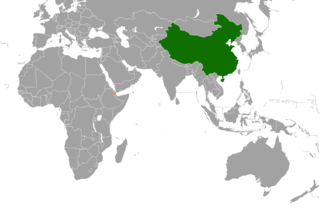
People's Republic of China–Djibouti relations refers to the current and historical relationship between the People's Republic of China and Djibouti. China and Djibouti established relations on January 8, 1979. China has financed a number of public works projects in Djibouti, including a stadium, the offices of the Ministry of Foreign Affairs and the People's Palace. In September 2010, Type 920 Hospital Ship, also known as the "Peace Ark", visited Djibouti.

Djibouti–France relations are the current and historical relationship between Djibouti and France. Djibouti was obtained as a colony by France in 1862. France officially controlled Djibouti until it received independence in 1977. Djibouti maintains military and economic agreements with France, which provide continued security and economic assistance. The largest French military base in Africa is located in Djibouti's territorial waters in the Red Sea. In December 2023, a new defense cooperation treaty is under discussion for renewal.

The 2011 Djiboutian protests were widespread demonstrations and riots that took place between January and March 2011 in Djibouti, situated in the Horn of Africa. A member of the Arab League, the protests in Djibouti showed a clear influence from the concurrent Arab Spring protests in North Africa and the Arabian Peninsula. The demonstrations ended after mass arrests and the barring of international observers.

The cinema of Djibouti refers to the film industry in Djibouti.
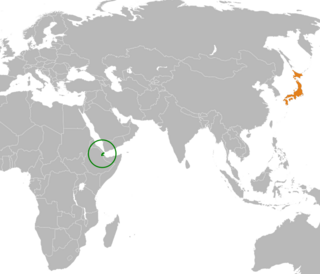
Djibouti–Japan relations are bilateral relations between Djibouti and Japan. Djibouti has maintained an embassy in Tokyo since 1989, whilst Japan has maintained an embassy in Djibouti City since 2009.
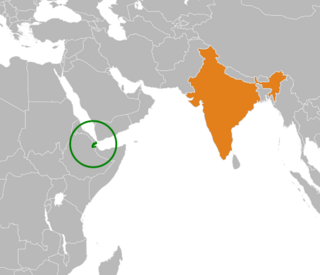
Djibouti–India relations are bilateral relations between Djibouti and India. Djibouti has an embassy in New Delhi and a Consulate-General in Mumbai. India has an embassy in Djibouti City.
The following is a timeline of the history of Djibouti, Djibouti.
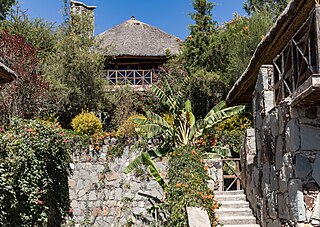
Kuriftu Resorts & Spa is a hotel chain in Ethiopia, serving Djibouti and Moucha Island. Founded, managed and operated by the Boston Partners Group in cooperation with Tadiwos Belete in 2002, the resort has various branches in Ethiopia; one of the main branch is located in Bishoftu, whereas the other in Bahir Dar, Adama, Langano and Semera.















